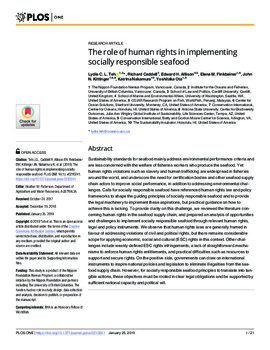The role of human rights in implementing socially responsible seafood
Abstract
Sustainability standards for seafood mainly address environmental performance criteria and are less concerned with the welfare of fisheries workers who produce the seafood. Yet human rights violations such as slavery and human trafficking are widespread in fisheries around the world, and underscore the need for certification bodies and other seafood supply chain actors to improve social performance, in addition to addressing environmental challenges. Calls for socially responsible seafood have referenced human rights law and policy frameworks to shape the guiding principles of socially responsible seafood and to provide the legal machinery to implement these aspirations, but practical guidance on how to achieve this is lacking. This paper explores the extent to which a recognised social responsibility standard is reinforced by existing human rights legal and policy instruments

